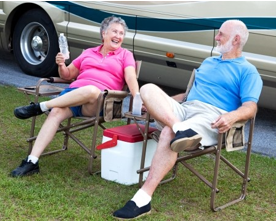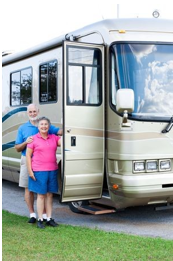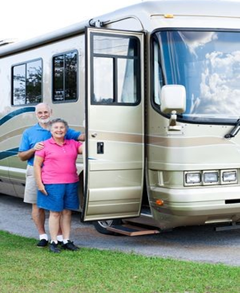Lifestyle & Travel
RV Seniors
RV Seniors are taking to the roads to explore the country in their retirement. Motorhomes have become a popular option for retirees, being a more mobile and compact way of living and discovering new places.
Time To Explore
A study in 2019 on behalf of TD Ameritrade found that 87% of retirees are especially interested in exploring life on the road in a mobile home or RV.

An emphasis on exploring the world has become the goal of many adults as part of life after retirement.
According to the RV Industry Association (RVIA), millions of Americans take to living full-time in their RVs, trailers, and motorhomes.
In 2017 RV sales saw a record rise. It is said that at least 10.5 million homes own at least one RV. In contrast to 2005 when only 7.5 million homes had owned RVs.
When asked, most retirees say that travelling and broadening experiences while still healthy and active is important to them. They want to travel and experience as much as possible.
Many seniors find they have a greater freedom to travel in their retirement. They are no longer tied down to their jobs or businesses. They have left behind their many years of family responsibilities. Retirees have the opportunity to make decisions on how to enjoy their time, activities and travels.
Economic Considerations
Buying and owning RVs can be costly, (with prices  for some new motorhome vehicles range from $150,000 to $1 million). Then there are fuel costs and living expenses.
for some new motorhome vehicles range from $150,000 to $1 million). Then there are fuel costs and living expenses.
The heavier motorhomes can use large amounts of fuel which can get expensive. The fuel expense increases when travelling greater distances.
Some retirees have savings and superannuation to fund their lifestyle choices. Sometimes extra resources are available, a “nest egg” or savings funds for travels in retirement. Although even on a pension and budget there can be lower cost options. If the prices of a brand new RVs are a stretch, there are less expensive options.
Second hand RVs can cost half the price of a brand new one. Caravans could also be considered when considering price. The advantage of the caravan is that it can be parked. The car can then be used separately to explore local areas.
Another option for some is to downsize the home to fund the RV and travel.

A study by CBRE Hotels Advisory Group, on behalf of the RVIA, estimates that two people living in an RV could potentially save between 8 percent – 53 percent of their money factoring in the costs of the RV itself more than they could on a traditional vacation for two. Although for RV retirees their roaming lifestyle often expands beyond the usual length of a vacation and extends for many months to over a year.
The study surveyed the cost of traditional travel such as plane tickets, hotel room accommodations, along with meals out. This was compared to the costs of RV travel, fuel costs, parking fees, and other living expenses. RV living cost less overall.
Having the mobile kitchen in the RV saves on the expenses of eating out every day.
Considerations When Choosing RV Living
According to retired blogger Jim Morgan, who spent a year researching RV lifestyles before embarking on his own in 2004, it is definitely important to be well informed. He recommends that before commencing a life of travel, it is helpful to “study, learn, read, and join all the Facebook groups you can.” This aids in getting a good grasp on what to expect when traveling and living in a mobile home or RV.
Rober Siuty, a senior financial consultant for TD Ameritrade explains that RV living gives retirees more flexibility than a traditional brick and mortar house. It allows them to take last-minute trips on a whim, and extend their vacations should they wish to do so, while still keeping costs contained.
Places To Stop
Another factor to consider when planning the RV lifestyle is where to go and what options are available for overnight stops. Some places have free facilities, but most have a fee to be able to park and stay for the night.
Some small towns will provide areas for RVs and caravans because the travelers are customers for the shops and other local businesses. There are some less inhabited areas that have free options to park or to camp overnight.
Holiday parks and camping grounds charge for overnight stays although they also provide facilities such as laundries and barbecues. Some areas, like beachfronts, are patrolled to prevent camping.
According to Kevin Broom, director of media relations for RVIA, a lot of the holiday places for RVs were built in the 50s and 60s and are outdated. As more people choose RV living, there is more demand for upgrading campgrounds to suit the modern lifestyle.

Parking
Parking can also present a challenge for RV owners, especially for the transit periods between camping locations. Some truck stops, hotels, and even churches allow overnight parking. With everyday activities, like stopping to do some shopping or have a coffee, parking can be tricky with a large vehicle. It can be tricky, having to find parking space beyond the standard car size parking area.
Adjustments
Retiring and choosing to pack away all your belongings in a small mobile home is not easy. There are realities and complexities to living in a mobile home that cannot be avoided. There is very little storage space so the lifetime of belongings from the average household are certainly not going to fit.
Some RV travelers maintain their house and belongings while travelling. Some put furniture in storage and rent their house. Some sell up to take up the gypsy lifestyle.
The RV is a compact mobile home but is also a machine, a big machine, Like all machines, it also needs constant upkeep and repairs. This is part of the lifestyle. In planning for an RV Seniors Lifestyle the vehicle machinery needs to be considered also.
It is important to have a thorough mechanical check before setting out. And also to plan regular checks and maintenance during travels. It is wise to have funds set aside in case there are more major issues to deal with. Be sure to check details of vehicle insurance and know what is covered. Ensure that the insurance coverage is maintained.
Conclusion:
There are considerations when choosing the RV lifestyle, and plans about possible routes. The travel plans can come down to preferences, budget, and lifestyle. A traditional tranquil idea of sitting out retirement is now being challenged as the world expands. More RV seniors tare taking to the roads on a journey of discovery.
A Motorhome Tale:
References:
https://money.com/retirement-rv-culture/
https://www.aarp.org/retirement/planning-for-retirement/info-2020/purchasing-rv-motorhome.html
https://blog.cheapism.com/retire-in-an-rv/#slide=2
https://ijins.umsida.ac.id/data/

